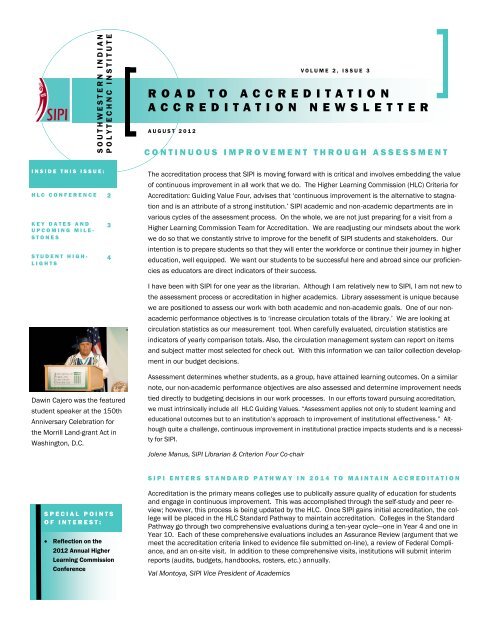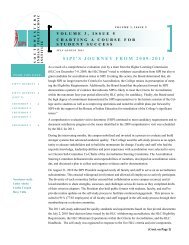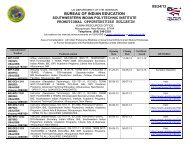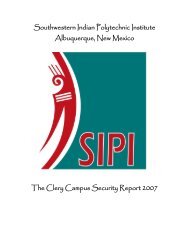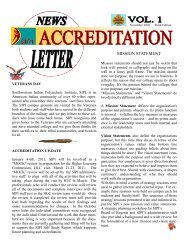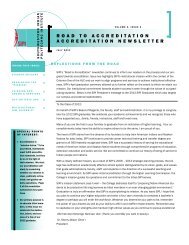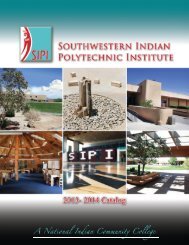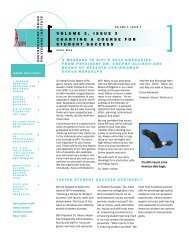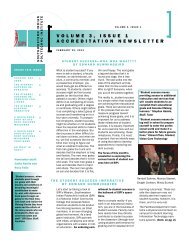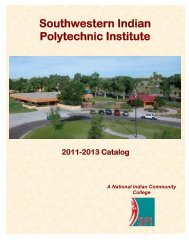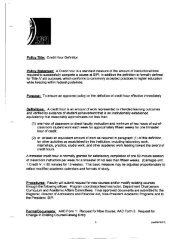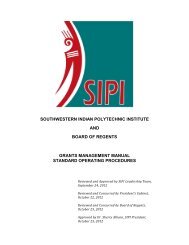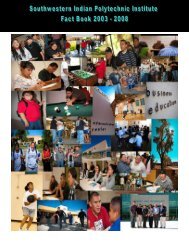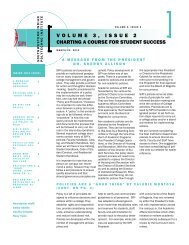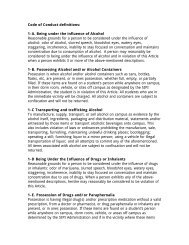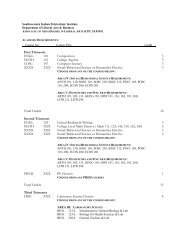August Newsletter - Southwestern Indian Polytechnic Institute
August Newsletter - Southwestern Indian Polytechnic Institute
August Newsletter - Southwestern Indian Polytechnic Institute
You also want an ePaper? Increase the reach of your titles
YUMPU automatically turns print PDFs into web optimized ePapers that Google loves.
S O U T H W E S T E R N I N D I A N<br />
P O L Y T E C H N C I N S T I T U T E<br />
V O L U M E 2 , I S S U E 3<br />
R O A D T O A C C R E D I T A T I O N<br />
A C C R E D I T A T I O N N E W S L E T T E R<br />
A U G U S T 2 0 1 2<br />
C O N T I N U O U S I M P R O V E M E N T T H R O U G H A S S E S S M E N T<br />
I N S I D E T H I S I S S U E :<br />
H L C C O N F E R E N C E 2<br />
K E Y D A T E S A N D<br />
U P C O M I N G M I L E -<br />
S T O N E S<br />
S T U D E N T H I G H -<br />
L I G H T S<br />
3<br />
4<br />
The accreditation process that SIPI is moving forward with is critical and involves embedding the value<br />
of continuous improvement in all work that we do. The Higher Learning Commission (HLC) Criteria for<br />
Accreditation: Guiding Value Four, advises that ‘continuous improvement is the alternative to stagnation<br />
and is an attribute of a strong institution.’ SIPI academic and non-academic departments are in<br />
various cycles of the assessment process. On the whole, we are not just preparing for a visit from a<br />
Higher Learning Commission Team for Accreditation. We are readjusting our mindsets about the work<br />
we do so that we constantly strive to improve for the benefit of SIPI students and stakeholders. Our<br />
intention is to prepare students so that they will enter the workforce or continue their journey in higher<br />
education, well equipped. We want our students to be successful here and abroad since our proficiencies<br />
as educators are direct indicators of their success.<br />
I have been with SIPI for one year as the librarian. Although I am relatively new to SIPI, I am not new to<br />
the assessment process or accreditation in higher academics. Library assessment is unique because<br />
we are positioned to assess our work with both academic and non-academic goals. One of our nonacademic<br />
performance objectives is to ‘increase circulation totals of the library.’ We are looking at<br />
circulation statistics as our measurement tool. When carefully evaluated, circulation statistics are<br />
indicators of yearly comparison totals. Also, the circulation management system can report on items<br />
and subject matter most selected for check out. With this information we can tailor collection development<br />
in our budget decisions.<br />
Dawin Cajero was the featured<br />
student speaker at the 150th<br />
Anniversary Celebration for<br />
the Morrill Land-grant Act in<br />
Washington, D.C.<br />
Assessment determines whether students, as a group, have attained learning outcomes. On a similar<br />
note, our non-academic performance objectives are also assessed and determine improvement needs<br />
tied directly to budgeting decisions in our work processes. In our efforts toward pursuing accreditation,<br />
we must intrinsically include all HLC Guiding Values. “Assessment applies not only to student learning and<br />
educational outcomes but to an institution’s approach to improvement of institutional effectiveness.” Although<br />
quite a challenge, continuous improvement in institutional practice impacts students and is a necessity<br />
for SIPI.<br />
Jolene Manus, SIPI Librarian & Criterion Four Co-chair<br />
S I P I E N T E R S S T A N D A R D P A T H W A Y I N 2 0 1 4 T O M A I N T A I N A C C R E D I T A T I O N<br />
S P E C I A L P O I N T S<br />
O F I N T E R E S T :<br />
Reflection on the<br />
2012 Annual Higher<br />
Learning Commission<br />
Conference<br />
Accreditation is the primary means colleges use to publically assure quality of education for students<br />
and engage in continuous improvement. This was accomplished through the self-study and peer review;<br />
however, this process is being updated by the HLC. Once SIPI gains initial accreditation, the college<br />
will be placed in the HLC Standard Pathway to maintain accreditation. Colleges in the Standard<br />
Pathway go through two comprehensive evaluations during a ten-year cycle—one in Year 4 and one in<br />
Year 10. Each of these comprehensive evaluations includes an Assurance Review (argument that we<br />
meet the accreditation criteria linked to evidence file submitted on-line), a review of Federal Compliance,<br />
and an on-site visit. In addition to these comprehensive visits, institutions will submit interim<br />
reports (audits, budgets, handbooks, rosters, etc.) annually.<br />
Val Montoya, SIPI Vice President of Academics
R O A D T O A C C R E D I T A T I O N<br />
Page 2<br />
A C C R E D I T A T I O N S T E E R I N G C O M M I T T E E A T T E N D S<br />
H I G H E R L E A R N I N G C O M M I S S I O N C O N F E R E N C E<br />
M A R C H 3 1 — A P R I L 3 , 2 0 1 2<br />
Reflections from the HLC Conference Attendees:<br />
Higher Learning Commission Conference:<br />
Reflections on SIPI Accreditation<br />
Dr. Sherry Allison, President of SIPI<br />
My objectives for the 2012 HLC Annual Conference were to strengthen involvement with college<br />
Presidents including tribal colleges and universities, enhance my knowledge about the changes<br />
made (with new criteria), and interact with HLC personnel. I attended several sessions but also had<br />
the opportunity to speak with Dr. Sylvia Manning, President, NCA-HLC, Dr. Andrew Lootens-White,<br />
HLC Liaison, and several other college presidents. All of these experiences and interactions were<br />
encouraging; this leaves me confident that we are on the right path as we prepare for initial accreditation.<br />
Although we have made tremendous progress, we must continue our efforts with assessment<br />
and program reviews; we need to not only complete the process but ensure buy-in and use of<br />
data. Accreditation is a process that evaluates quality, provides a road map for improvement, assures<br />
the public of quality and is required for colleges to receive federal funds for student financial<br />
aid and program grants—accreditation is crucial!<br />
Monte Monteith, Acting Vice President of College Operations<br />
The main concept that I came back with was, “You are not alone.” When I attended the various sessions,<br />
it was comforting to discuss IT issues or funding dilemmas in one session; then I would go to<br />
another and talk about security and federal regulations. The most interesting part is that the other<br />
participants understand what we are going through and may have suggestions for us. You learn a<br />
great deal about what others are doing and realize that our problems are not unique. In many ways,<br />
we are all going through this together and we have other resources we can tap into.<br />
Cathy Abeita, Education Program Specialist<br />
Attending the HLC Annual Meeting gave me the opportunity to revisit the basics of what the selfstudy<br />
process is all about. Accreditation is a status granted to an educational institution that has<br />
met or exceeded specific standards of quality. SIPI is seeking initial accreditation by the HLC of the<br />
North Central Association of Colleges and Schools (NCA), which is one of six regional institutional<br />
accreditors in the United States. The HLC accredits degree-granting post secondary education institutions<br />
in the North Central region. The benefits of accreditation include: Public assurance that SIPI<br />
meets or exceeds specific standards of quality; makes SIPI eligible to participate in Title IV student<br />
financial aid programs; and provides SIPI with self and peer review encouragement to improve. In<br />
addition, institutions rely on accreditation in their decisions to recognize transfer credit.<br />
The HLC Conference<br />
is substantial with<br />
an extensive list of<br />
workshops<br />
pertaining to;<br />
Accreditation,<br />
Federal<br />
Compliance, Data<br />
Driven Decision<br />
Making, Shared<br />
Governance, the<br />
Self-Study Process,<br />
Course Evaluations,<br />
Student Retention<br />
and more. The SIPI<br />
delegates gained<br />
insight, knowledge<br />
and ideas to<br />
support the synergy<br />
necessary for<br />
progress.<br />
Christopher M. Harrington, Department Chair for Business Technologies and Liberal Arts<br />
My impression after attending the HLC 2012 Conference was how far ahead SIPI is compared to<br />
many of the other institutions in regards to assessment. I know that our entire faculty, including<br />
adjuncts, is included in assessment and other processes from curriculum development to annual<br />
and 5 year program reviews. All here at SIPI are engaged in the process. This should bode well for<br />
our 2013 accreditation visit.<br />
Gloria Mariano, Department Chair for Academic Support, Adult & Developmental Education<br />
I gained a much better understanding of the process and journey SIPI has been working on over the<br />
past two years in the accreditation process. I look at this process as a puzzle and the conference<br />
helped me to fit more of the pieces together to make a whole picture. One important item that I<br />
heard constantly was communication and participation within the organization. Many presenters<br />
stressed the idea of teamwork and community in their institutions. I feel our leadership has also<br />
modeled in our institution; everyone is important.<br />
Barbara James, Program Support Assistant<br />
There were three themes that stuck with me: “It’s all about the data, the campus needs to understand<br />
the criteria so it becomes embedded in their processes;” and “establish a common language<br />
about what assessment is.” I now recognize the importance of keeping a sustainable and flexible<br />
resource room, of maintaining the required materials for the room, of using technology to organize<br />
and track self-study evidence of developing a plan to connect evidence to the HLC Criteria, and of<br />
displaying the evidence that supports the self-study. I gained new insight to create a resource room<br />
that is organized in a manner that best promotes our mission.<br />
The Higher Learning Commission<br />
Conference for Accreditation had<br />
more than 4,000 attendees.
V O L U M E 2 , I S S U E 3<br />
Page 3<br />
A C C R E D I T A T I O N C A L E N D AR<br />
<strong>August</strong> 1, 2012 Campus wide meeting<br />
<strong>August</strong> 8, 2012 Accreditation Sub-committee Meetings<br />
<strong>August</strong> 16 & 17, 2012 ALL STAFF Colloquium<br />
<strong>August</strong> 22, 2012 Accreditation Subcommittee Meeting<br />
<strong>August</strong> 2012<br />
Sun Mon Tue Wed Thu Fri Sat<br />
1 2 3 4<br />
5 6 7 8 9 10 11<br />
12 13 14 15 16 17 18<br />
19 20 21 22 23 24 25<br />
26 27 28 29 30 31<br />
UPCOMING EVENTS<br />
<br />
<br />
<br />
Continuous data collection & analysis<br />
September 4, 2012 First day of Fall Trimester<br />
October 22-26, 2012 Mid-terms<br />
SIPI certificate<br />
and degree<br />
programs ensure<br />
a breadth of<br />
knowledge and<br />
promote<br />
intellectual<br />
inquiry through<br />
the General<br />
Education<br />
requirements,<br />
“this component<br />
of the curriculum<br />
prepares<br />
students to live<br />
in and contribute<br />
to a dynamic,<br />
complex, and<br />
multicultural<br />
world as<br />
productive lifelong<br />
learners and<br />
tribal members,<br />
in an ever<br />
changing global<br />
environment” (p.<br />
25, 2011-2013<br />
SIPI Catalog).<br />
The four General<br />
Education<br />
Competencies<br />
are:<br />
Communication,<br />
Interpersonal/<br />
Teamwork Skills,<br />
Cultural Legacy,<br />
and Critical<br />
Thinking.<br />
<br />
<br />
<br />
<br />
October, Request for HLC Visit in 2013 *Visit has been requested, fees need to be submitted<br />
November 1, 2012 Second Draft of Self-Study DUE<br />
December 5, 2012 Campus Wide Meeting<br />
February 1, 2012 Final Draft of Self-Study DUE
S O U T H W E S T E R N I N D I A N<br />
P O L Y T E C H N C I N S T I T U T E<br />
Mailing Address:<br />
P.O. Box 10146; Albuquerque, NM 87184<br />
Street Address:<br />
9169 Coors Blvd NW, Albuquerque, NM 87120<br />
Phone:<br />
800-586-7474<br />
Website:<br />
http://www.sipi.edu<br />
<strong>Southwestern</strong> <strong>Indian</strong> <strong>Polytechnic</strong> <strong>Institute</strong><br />
S T U D E N T H I G H L I G H T S<br />
News Release : June 28, 2012<br />
Off ice of the Assistant Secretary-<strong>Indian</strong> Affairs<br />
“Laverdure Lauds SIPI Student Darwin Cajero as Featured Speaker at 150th Anniversary Celebration<br />
for the Morril Land –grant Act”<br />
WASHINGTON, D.C.— Acting Assistant Secretary-<strong>Indian</strong> Affairs Donald E. “Del” Laverdure lauded<br />
Darwin Cajero, a student at the <strong>Southwestern</strong> <strong>Indian</strong> <strong>Polytechnic</strong> <strong>Institute</strong> (SIPI) in Albuquerque,<br />
NM, who was a featured speaker at the sesquicentennial celebration of the Morrill Land-grant<br />
Act of 1862, on Tuesday, June 26, 2012, at the Ronald Reagan Building and International Trade<br />
Center.<br />
A N A T I O N A L I N D I A N C O M M U N I T Y C O L L E G E T H A T<br />
P R E P A R E S N A T I V E A M E R I C A N S T U D E N T S T O B E<br />
P R O D U C T I V E L I F E - L O N G L E A R N E R S , A S T R I B A L<br />
M E M B E R S , I N A N E V E R - C H A N G I N G G L O B A L E N V I R O N M E N T .<br />
The Morrill Land-grant<br />
Act was written by<br />
Senator Justin Smith<br />
Morrill of Vermont and<br />
signed into law on July<br />
2, 1862, by President<br />
Abraham Lincoln. The<br />
legislation provided<br />
grants of federal lands<br />
to the states for the<br />
establishment of public<br />
universities and led<br />
to the democratization<br />
of higher education.<br />
The American <strong>Indian</strong><br />
Higher Education Consortium,<br />
a national<br />
association of tribal<br />
colleges and universities,<br />
also is celebrating<br />
the federal land-grant<br />
status of its 33 member<br />
institutions.<br />
“I am please to see SIPI and Mr. Cajero in the spotlight with the Association of Public and Landgrant<br />
Universities (APLU) and nearly 600 public university leaders and others from government,<br />
philanthropy and business to celebrate the 150th anniversary of the Morrill Land-grant Act,” said<br />
Laverdure. “To be considered for this honor Mr. Cajero went through an extensive competitive<br />
selection process. His story is a testimony to all Native students who are actively making a difference<br />
seeking higher education and devoting their knowledge to their respective communities in<br />
<strong>Indian</strong> Country.”<br />
Cajero is serving as the American <strong>Indian</strong> Higher Education Consortium, Tribal College and Universities<br />
(TCU) representative. “The scientific knowledge that I’ve gained has given me a wider view<br />
of our natural resources on the reservation,” said Cajero. “With education and experience I can<br />
help the tribe to address the areas of wildlife management, water quality, green energy and land<br />
use. I am grateful for my experiences and use them as a basis to mentor individuals from Jemez<br />
and students on campus-I don’t mind sharing what I have learned.”<br />
Darwin Cajero (Jemez Pueblo) is<br />
studying for an Associate’s degree<br />
in Natural Resources and a Certificate<br />
in Geospatial Information<br />
Technology. Darwin is pictured<br />
here with his family.<br />
Written by Nedra Darling<br />
SIPI is proud of Darwin Cajero and would like to congratulate him for a job well done!


